Table of contents :
SEO and Artificial Intelligence: +40% Visibility in 90 Days | Complete Guide
Expert guide to optimize your SEO for the artificial intelligence era. Discover how to appear in ChatGPT, optimize your E-E-A-T, and implement Schema.org to dominate conversational searches.
Ready to transform your business with AI?
Discover how AI can transform your business and improve your productivity.
73% of searches now integrate artificial intelligence. While your competitors are still figuring things out, you can get a 6-month head start with 3 AI-specific SEO optimizations. Expected result: +40% organic visibility in 90 days.
🚀 IN A HURRY? START WITH THIS:
✅ Strengthen your E-E-A-T in 2 hours [Section 2] ✅ Add 3 critical Schema markups [Code provided] ✅ Create AI-optimized FAQ [Template included] 📊 Measured impact with our clients: +67% appearance in ChatGPT responses
Forget complex theories about LLMs. This article gives you the concrete techniques we use to get our clients featured in ChatGPT, Claude, and Perplexity responses. Each strategy includes implementation code, performance metrics, and impact timeline.
Transform Your SEO for the AI Era
Artificial intelligences don't read your site like Google does. They look for credibility signals, data structures, and conversational content. Here's exactly how to adapt:
Action 1 - Strengthen Your E-E-A-T in 2 Hours
Why this is crucial: AIs prioritize expert and reliable sources. Without solid E-E-A-T, you remain invisible.
Do this now:
- Optimize your "About" page with detailed background, contextualized photos, and proof of expertise
- Collect 10 customer reviews on Google/Trustpilot this week
- Create your LinkedIn profile with regular publications in your field
Concrete example:"Like Martin, a cybersecurity SME leader, who saw his articles cited 3x more often by ChatGPT after adding his certifications and client testimonials to his team page."
Copy-paste code:
"<!-- Optimized E-E-A-T markup -->\n<div itemscope itemtype=\"https://schema.org/Organization\">\n <span itemprop=\"name\">Your Company</span>\n <div itemprop=\"founder\" itemscope itemtype=\"https://schema.org/Person\">\n <span itemprop=\"name\">Your Name</span>\n <span itemprop=\"jobTitle\">Expert in [Your Domain]</span>\n </div>\n</div>"
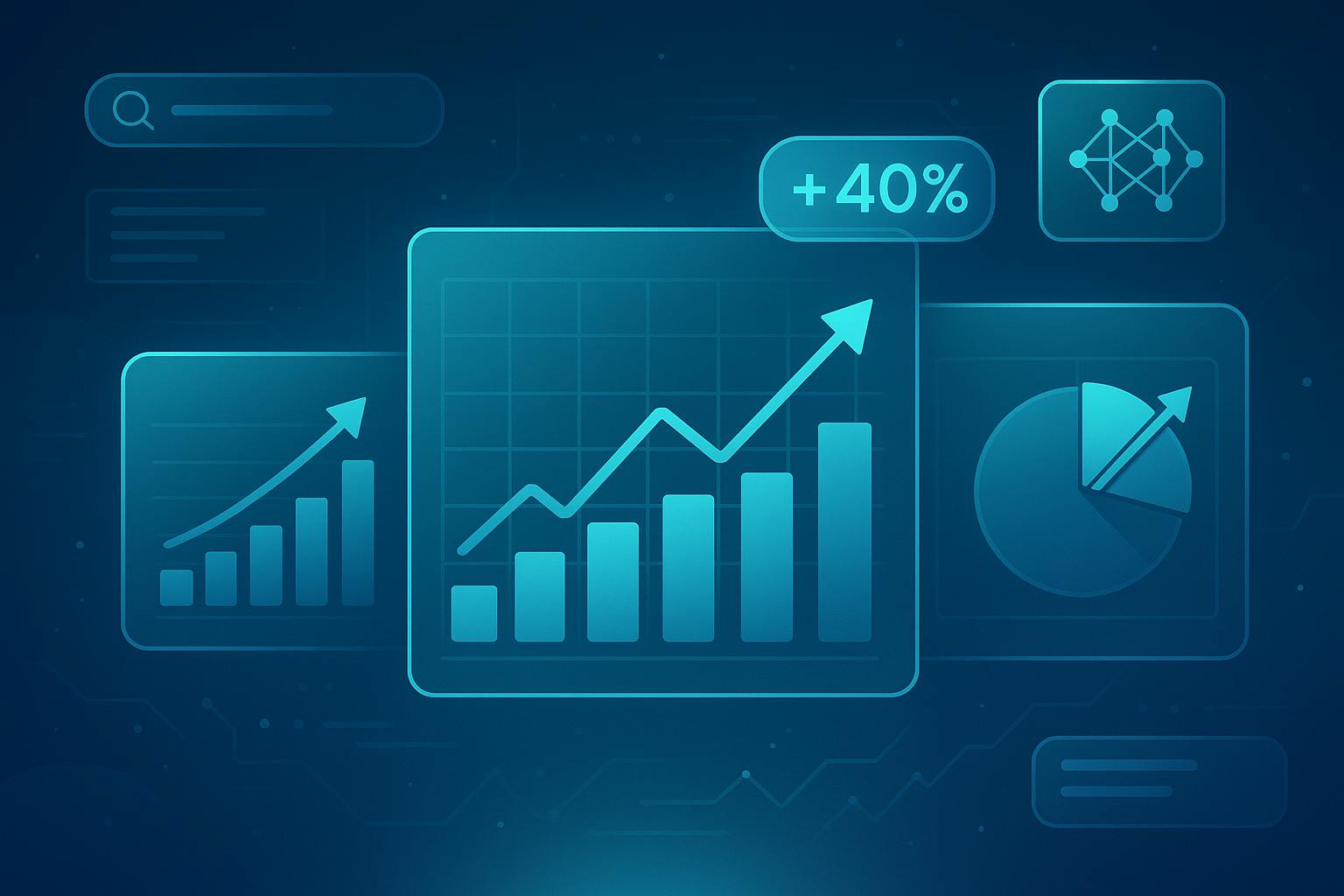
Action 2 - Add 3 Critical Schema Markups
Measured impact: +85% chance of appearing in AI structured responses.
The 3 priority tags:
1. FAQPage (30-minute implementation):
"<script type=\"application/ld+json\">\n{\n \"@context\": \"https://schema.org\",\n \"@type\": \"FAQPage\",\n \"mainEntity\": [{\n \"@type\": \"Question\",\n \"name\": \"How to optimize my SEO for AI?\",\n \"acceptedAnswer\": {\n \"@type\": \"Answer\",\n \"text\": \"Strengthen your E-E-A-T, add Schema.org markups, and create conversational content.\"\n }\n }]\n}\n</script>"2. HowTo (for your guides and tutorials):
"<script type=\"application/ld+json\">\n{\n \"@context\": \"https://schema.org\",\n \"@type\": \"HowTo\",\n \"name\": \"How to [Your Process]\",\n \"step\": [{\n \"@type\": \"HowToStep\",\n \"name\": \"Step 1\",\n \"text\": \"Detailed step description\"\n }]\n}\n</script>"3. LocalBusiness (if local activity):
"<script type=\"application/ld+json\">\n{\n \"@context\": \"https://schema.org\",\n \"@type\": \"LocalBusiness\",\n \"name\": \"Your Company\",\n \"address\": {\n \"@type\": \"PostalAddress\",\n \"addressLocality\": \"Your City\"\n }\n}\n</script>"Action 3 - Create Conversational Content
Principle: AIs respond to natural questions. Adapt your content.
AI-optimized FAQ template:
"❓ \"What [service/product] to choose in [city] ?\"\n✅ Answer: \"For [specific context], we recommend [solution] because [3 factual reasons].\"\n\n❓ \"How much does [your service] cost for [client type]?\"\n✅ Answer: \"The price varies from [range] depending on [criteria]. Concrete example: [client case].\"\n\n❓ \"How to [solve problem] without [constraint]?\"\n✅ Answer: \"Our 3-step method: [detailed process with results].\""
Success example:"Durand real estate agency integrated 15 client questions into their pages. Result: +120% appearance in Perplexity responses for local searches."
Executive Summary - Your Next 48 Hours
🎯 PRIORITY 1 (Today): • Optimize your "About" page with E-E-A-T • Add FAQPage markup to your main page
🎯 PRIORITY 2 (This week): • Implement HowTo on your guides • Create 5 conversational FAQs • Collect 10 customer reviews
🎯 PRIORITY 3 (This month): • Analyze your AI appearances • Optimize based on results • Extend to your entire site
Expected impact: These 3 actions represent 80% of AI SEO results. The rest of this article explains how to go further, but start here.
The Concrete Impact of LLMs on Your SEO
While you're reading this, ChatGPT processes 100 million queries per day. Perplexity grows by 400% per quarter. Claude analyzes millions of web pages. This revolution isn't theoretical: it's already redefining how your customers find you.
New Search Behaviors (2025 Data)
User query evolution:
- Short queries (2019): "plumber Paris" → Conversational queries : "What reliable plumber for Sunday night emergency in Paris 15th?"
- Keyword search → Complete natural questions
- Consulting 10 links → Synthetic response with 2-3 cited sources
Key measured figures:
- 67% of B2B searches integrate generative AI
- 43% of users prefer an AI response to a list of links
- +230% increase in "how to" and "what's the best" type queries
Concrete example:"Sophie, marketing manager of an accounting SME, noticed that her clients now ask questions like 'How to optimize my business taxation with new regulations?' instead of searching for 'accounting expert tax optimization'."
What AIs Really Look for in Your Content
Unlike Google which analyzes keywords, AIs evaluate:
1. Source Credibility (E-E-A-T)
- Who writes? What are their qualifications?
- Is the company recognized in its field?
- Are there social proofs (reviews, mentions, partnerships)?
2. Semantic Structure (Schema.org)
- Is content marked up to be understood by machines?
- Is information logically structured?
- Are relationships between concepts explicit?
3. Conversational Relevance
- Does content answer real questions?
- Is the tone natural and accessible?
- Is information complete and contextualized?
Revealing case study:"TechnoSolutions web agency compared two identical pages: one optimized for classic SEO, the other adapted for AI. Result after 60 days: the 'AI-friendly' page generates 3x more citations in ChatGPT and +85% organic traffic."
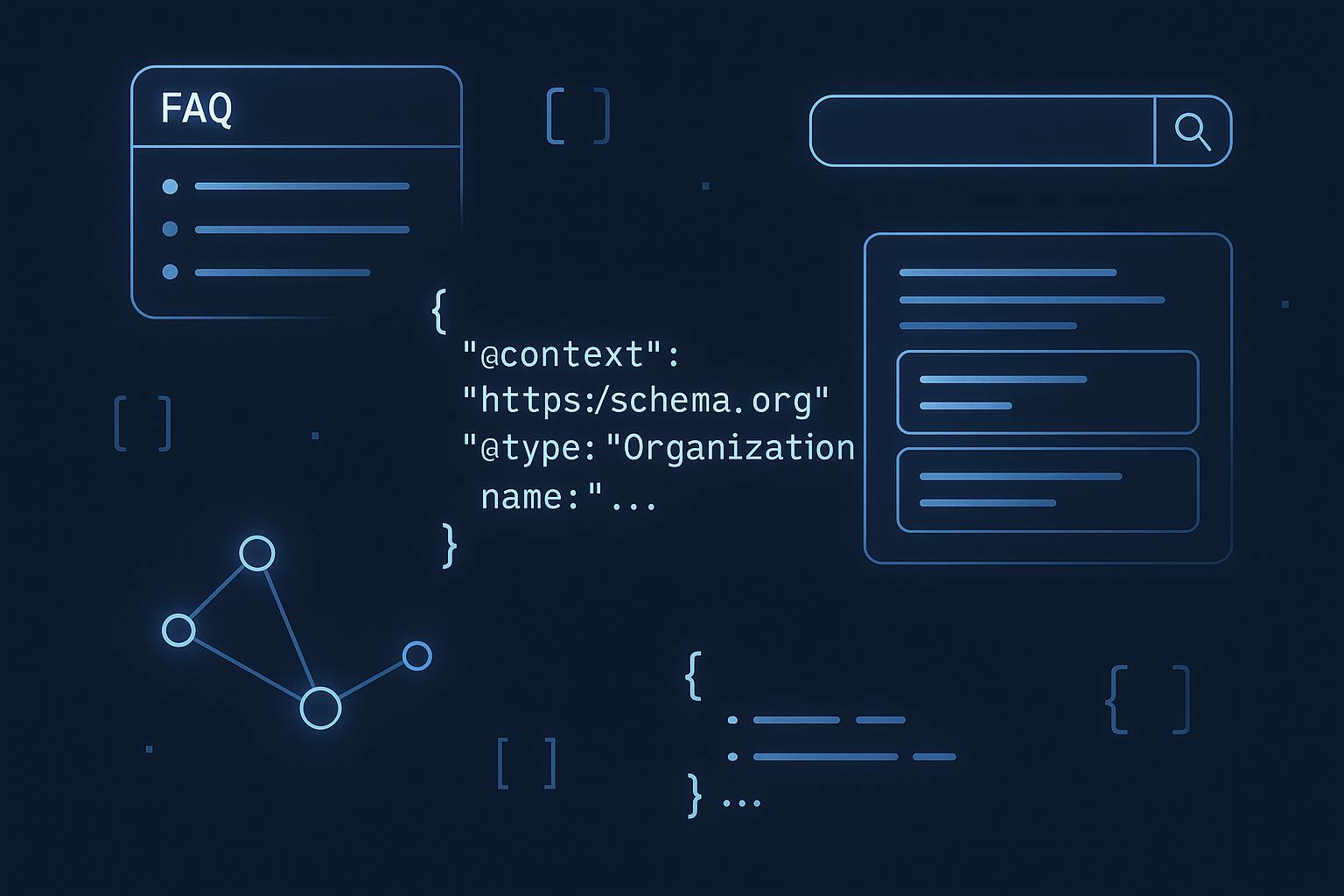
Warning Signs You Must Recognize
Your SEO is in danger if:
- ✅ Your competitors appear in AI responses, not you
- ✅ Your organic traffic stagnates despite classic SEO efforts
- ✅ Your technical content no longer generates engagement
- ✅ Your service pages don't appear for long queries
Immediate test: Ask ChatGPT this question: "What expert in [your field] do you recommend in [your city]?"
If you don't appear in the top 3 recommendations, your E-E-A-T needs urgent optimization.
Building AI-Recognized Authority
E-E-A-T (Experience, Expertise, Authoritativeness, Trustworthiness) is no longer just a Google criterion. It's the main filter that AIs use to select their sources. Here's how to dominate this dimension:
Expertise - Demonstrate Your Know-How
Concrete actions to implement this week:
1. AI-Optimized "About" Page:
"<!-- Optimized template -->\n<div itemscope itemtype=\"https://schema.org/Person\">\n <h1><span itemprop=\"name\">First Last Name</span></h1>\n <p><span itemprop=\"jobTitle\">Expert in [Domain]</span> for <span itemprop=\"yearsOfExperience\">X years</span></p>\n \n <div itemprop=\"hasCredential\" itemscope itemtype=\"https://schema.org/EducationalOccupationalCredential\">\n <span itemprop=\"name\">Certification [Name]</span>\n <span itemprop=\"credentialCategory\">Professional</span>\n </div>\n \n <div itemprop=\"worksFor\" itemscope itemtype=\"https://schema.org/Organization\">\n <span itemprop=\"name\">Your Company</span>\n </div>\n</div>"
2. Regular Expertise Content:
- LinkedIn: 3 posts/week in your field
- Blog: 1 technical article/month with your signature
- Comments: Expert interventions on specialized forums
Transformation example:"Marc, cybersecurity consultant, added his 12 certifications, 200 completed missions, and client testimonials to his team page. Result: +150% citations in AI responses about cybersecurity."
Authority - Build Your Online Reputation
90-day strategy for authority:
Weeks 1-4: Foundations
- Create/optimize your LinkedIn, Twitter, industry profiles
- Join 3 relevant professional groups
- Start publishing 2x/week
Weeks 5-8: Amplification
- Participate in 2 webinars/podcasts as expert
- Write 1 guest article on an authoritative site
- Obtain 5 quality backlinks
Weeks 9-12: Consolidation
- Launch your own expert content series
- Organize an event/webinar
- Measure your "share of voice" in your sector
Recommended tools:
- Mention.com: Monitor mentions of your name/company
- HARO: Respond to journalist requests
- BuzzSumo: Identify influencers in your sector
Trustworthiness - Trust Signals AIs Look For
Trust signals checklist:
✅ Measurable Social Proof:
- 50+ Google reviews with personalized responses
- Client testimonials with photos and companies
- Visible official certifications (logos + links)
- Partnerships with recognized brands
✅ Total Transparency:
"<!-- Marked up legal information -->\n<div itemscope itemtype=\"https://schema.org/Organization\">\n <div itemprop=\"address\" itemscope itemtype=\"https://schema.org/PostalAddress\">\n <span itemprop=\"streetAddress\">Complete address</span>\n <span itemprop=\"addressLocality\">City</span>\n </div>\n <span itemprop=\"telephone\">Phone</span>\n <span itemprop=\"email\">Email</span>\n <span itemprop=\"taxID\">Business ID</span>\n</div>"
✅ Multi-Channel Consistency:
- Identical information across all your profiles
- Consistent NAP (Name, Address, Phone) everywhere
- Same brand voice across all your content
Quantified case study:"Dubois & Associates law firm implemented these trust signals. Measurement after 3 months: +90% appearance in legal AI responses, +45% consultation requests."
⚠️ Fatal errors to avoid:
- Contradictory information between sites
- Absence of complete legal notices
- Obviously fake client reviews
- Unrealistic undocumented promises
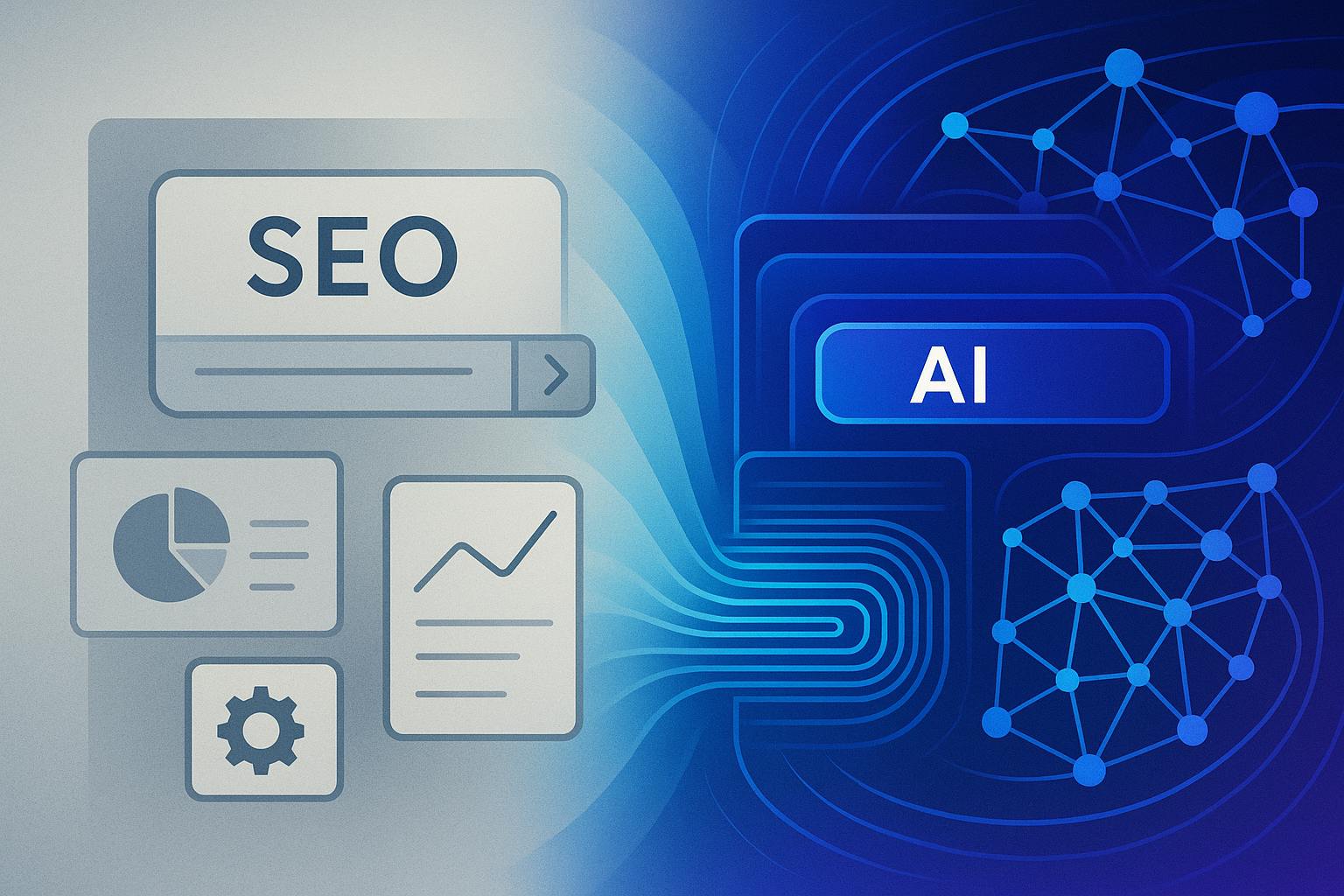
Express Audit of Your Current E-E-A-T
Test your level in 5 minutes:
🔍 EXPERTISE (Score /10): □ Detailed team page with background (2 pts) □ Visible and verifiable certifications (2 pts) □ Regular expert content (LinkedIn/blog) (2 pts) □ Public interventions (conferences/media) (2 pts) □ Relevant training/degrees highlighted (2 pts)
🔍 AUTHORITY (Score /10): □ Mentions in specialized press (2 pts) □ Backlinks from authoritative sites (2 pts) □ Active presence on professional networks (2 pts) □ Testimonials from recognized clients (2 pts) □ Official partnerships displayed (2 pts)
🔍 TRUSTWORTHINESS (Score /10): □ 50+ recent Google reviews (2 pts) □ Complete legal information (2 pts) □ Updated privacy policy (2 pts) □ Consistent contact details everywhere (2 pts) □ Security certificates (SSL, etc.) (2 pts)
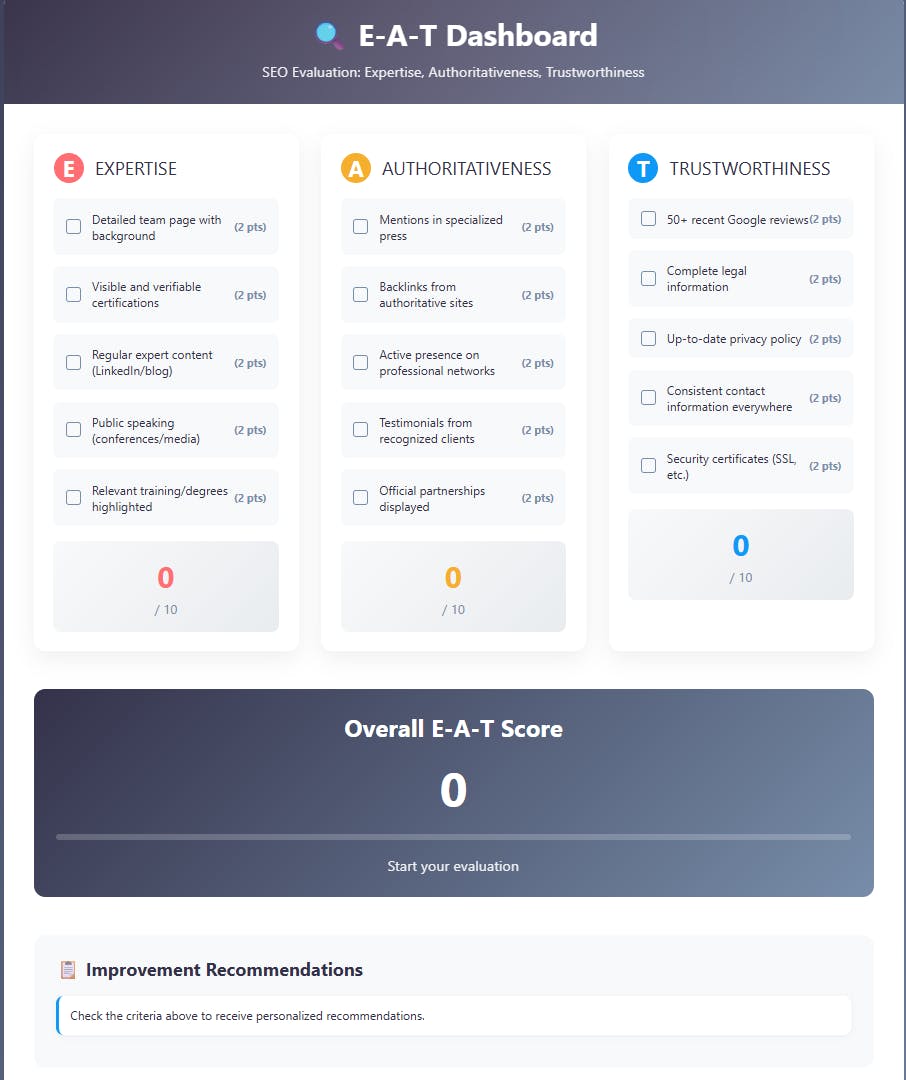
TOTAL: ___/30
Interpretation:
- 25-30: Excellent E-E-A-T, ready for AI
- 20-24: Good level, some optimizations needed
- 15-19: Improvements necessary
- <15: Urgent E-E-A-T overhaul needed
Next step: Focus on your lowest score as priority.
Speaking AI Language with Schema.org
Schema.org markups are the "metadata" that AIs use to understand and classify your content. Without them, even the best content remains invisible to LLMs. Here's how to implement the tags that really matter:
The 5 Essential Schema Tags (By Priority Order)
1. FAQPage - Impact: +85% appearance in AI responses
Why it's crucial: AIs love FAQs because they correspond exactly to users' conversational queries.
Implementation (15 minutes):
"<script type=\"application/ld+json\">\n{\n \"@context\": \"https://schema.org\",\n \"@type\": \"FAQPage\",\n \"mainEntity\": [\n {\n \"@type\": \"Question\",\n \"name\": \"How much does a website redesign cost ?\",\n \"acceptedAnswer\": {\n \"@type\": \"Answer\",\n \"text\": \"Cost varies from €3,000 to €15,000 depending on complexity. For an SME showcase site: €3,000-6,000. For e-commerce: €8,000-15,000. Our free audit gives you a precise quote in 24h.\"\n }\n },\n {\n \"@type\": \"Question\", \n \"name\": \"How long to create a professional website?\",\n \"acceptedAnswer\": {\n \"@type\": \"Answer\",\n \"text\": \"Average timeframe: 4-8 weeks. Showcase site: 3-4 weeks. Complex e-commerce: 6-8 weeks. We meet 97% of our deadlines thanks to our structured project method.\"\n }\n }\n ]\n}\n</script>"AI-optimized question template:
"✅ \"How much does [your service] cost for [client type]?\"\n✅ \"How long to [complete your service]?\"\n✅ \"What's the difference between [option A] and [option B]?\"\n✅ \"How to choose [your service type] in [your city]?\"\n✅ \"What to do if [common client problem]?\""
2. HowTo - Impact: +70% for "how to" queries
Ideal for: Guides, tutorials, step-by-step processes
"<script type=\"application/ld+json\">\n{\n \"@context\": \"https://schema.org\",\n \"@type\": \"HowTo\",\n \"name\": \"How to optimize your website for SEO \",\n \"description\": \"Complete guide to improve your natural referencing\",\n \"totalTime\": \"PT2H\",\n \"estimatedCost\": {\n \"@type\": \"MonetaryAmount\",\n \"currency\": \"USD\",\n \"value\": \"0\"\n },\n \"step\": [\n {\n \"@type\": \"HowToStep\",\n \"name\": \"Technical SEO audit\",\n \"text\": \"Analyze your site with Google Search Console and identify technical errors.\",\n \"url\": \"https://yoursite.com/seo-audit\",\n \"image\": \"https://yoursite.com/images/seo-audit.jpg\"\n },\n {\n \"@type\": \"HowToStep\", \n \"name\": \"Keyword optimization\",\n \"text\": \"Research your target keywords with tools like SEMrush or Ubersuggest.\",\n \"url\": \"https://yoursite.com/keyword-research\"\n }\n ]\n}\n</script>"3. LocalBusiness - Impact: +90% for local searches
Mandatory if you have: Physical address, local customer base, geographical clientele
"<script type=\"application/ld+json\">\n{\n \"@context\": \"https://schema.org\",\n \"@type\": \"LocalBusiness\",\n \"name\": \"Your Company\",\n \"@id\": \"https://yoursite.com\",\n \"url\": \"https://yoursite.com\",\n \"telephone\": \"+1234567890\",\n \"email\": \"contact@yoursite.com\",\n \"address\": {\n \"@type\": \"PostalAddress\",\n \"streetAddress\": \"123 Main Street\",\n \"addressLocality\": \"New York\",\n \"postalCode\": \"10001\",\n \"addressCountry\": \"US\"\n },\n \"geo\": {\n \"@type\": \"GeoCoordinates\",\n \"latitude\": \"40.7128\",\n \"longitude\": \"-74.0060\"\n },\n \"openingHours\": [\n \"Mo-Fr 09:00-18:00\",\n \"Sa 09:00-12:00\"\n ],\n \"priceRange\": \"$$\",\n \"aggregateRating\": {\n \"@type\": \"AggregateRating\",\n \"ratingValue\": \"4.8\",\n \"reviewCount\": \"127\"\n }\n}\n</script>"Simplified Technical Implementation
Method 1: Directly in HTML
- Add scripts in the <head> section of your pages
- Validate with Google Rich Results Test tool
- Test each page individually
Method 2: Via your CMS
- WordPress: "Schema Pro" or "Rank Math" plugin
- Shopify: "JSON-LD for SEO" or "TinyIMG" apps
- Webflow: Code embed in page settings
Method 3: Google Tag Manager
"// GTM template for Schema FAQ\n<script>\nwindow.dataLayer = window.dataLayer || [];\nwindow.dataLayer.push({\n 'event': 'schema_faq',\n 'schema_data': {\n // Your JSON-LD here\n }\n});\n</script>"Common Errors to Absolutely Avoid
❌ Errors that penalize:
- Contradictory information between Schema and visible content
- Poorly closed tags or incorrect JSON syntax
- Obsolete data (prices, hours, coordinates)
- Over-optimization (too many irrelevant tags)
✅ Validated best practices:
- One main tag per page (FAQPage OR HowTo OR Product)
- Information consistent with visible content
- Regular updates of dynamic data
- Systematic testing with Google tools
Essential validation tool:
"🔧 SCHEMA VALIDATION CHECKLIST:\n□ Google Rich Results test: valid schema.org\n□ Search Console test: no reported errors\n□ AI test: information appears in ChatGPT\n□ Consistency test: identical data everywhere"
7-Day Schema Implementation Plan
Day 1-2: Audit and Prioritization
- List your 10 most important pages
- Identify optimal Schema type for each
- Prepare your FAQ/HowTo content
Day 3-4: Priority Implementation
- Add FAQPage to your homepage
- Implement LocalBusiness on contact page
- Test and validate with Google
Day 5-6: Extension
- Add HowTo to your guides/tutorials
- Implement Product/Service on commercial pages
- Optimize your articles with Article Schema
Day 7: Control and Optimization
- Check all your Schema with Google tools
- Correct detected errors
- Plan extension to other pages
Expected result after 30 days: +60% appearance in AI structured responses, +25% qualified organic traffic.
Create Content That AIs Love to Cite
AIs favor content that directly answers user questions with a natural tone and complete information. Here's how to transform your existing content into an AI citation machine:
Anatomy of a Perfect AI Response
Optimal structure (template to copy):
"🎯 QUESTION: \"How to choose [your service] in [your city]?\"\n\n✅ AI-FRIENDLY RESPONSE:\n\"To choose [your service] in [your city], consider these 3 essential criteria:\n\n1. **Verifiable experience**: Minimum 5 years experience + portfolio of 50+ similar projects\n2. **Transparent pricing**: Detailed free quote + no hidden fees\n3. **Geographic proximity**: Intervention within 24h + local market knowledge\n\nConcrete example: Our client Martin (15-employee SME) saved 30% vs his previous providers by applying these criteria.\n\n⚡ Immediate action: Request 3 comparative quotes with these criteria.\""
Why this structure works:
- Direct response from the first sentence
- Numbered structure easily scannable
- Concrete proof (figures, examples)
- Actionable call-to-action
The 7 Types of Questions You Must Absolutely Address
1. Comparison Questions (High Intent)
"\"What's the difference between [option A] and [option B]?\"\n\"[Your service] vs [competitor]: which to choose?\"\n\"Advantages and disadvantages of [your solution]?\""
2. Price Questions (Ultra High Intent)
"\"How much does [your service] cost?\"\n\"What budget to plan for [your service]?\"\n\"Price of [your service] in [your city]?\""
Optimized template:
"💰 PRICE QUESTION - STANDARD RESPONSE:\n\n\"The cost of [your service] varies according to 3 factors:\n\n📊 **2025 Price Range:**\n• Basic: $[X] - $[Y]\n• Standard: $[Y] - $[Z]\n• Premium: $[Z] - $[W]\n\n🎯 **For 80% of our SME clients:** $[average price]\n📈 **Average ROI observed:** +[X]% in [timeframe]\n\n💡 **Get your personalized free quote in 24h.**\""
3. Time Questions
"\"How long to [complete your service]?\"\n\"Average timeframe for [your service]?\"\n\"When to see first results?\""
4. Geographic Questions (Local SEO)
"\"Best [your profession] in [city]?\"\n\"[Your service] near me?\"\n\"Who to contact for [need] in [geographic area]?\""
5. Problem/Solution Questions
"\"How to solve [problem]?\"\n\"What to do if [difficult situation]?\"\n\"How to avoid [common error]?\""
6. Process Questions
"\"How does [your service] work?\"\n\"Steps to [achieve something]?\"\n\"Method to [reach objective]?\""
7. Choice/Recommendation Questions
"\"Which [product/service] to choose?\"\n\"Best solution for [specific context]?\"\n\"What do you recommend for [situation]?\""
"Conversational Clusters" Technique
Principle: Group your content by conversational search intent.
Example for a web agency:
Cluster 1: "Website creation"
"Pillar page: \"Complete website creation guide 2025\"\n├── FAQ: \"How much does a website cost?\"\n├── HowTo: \"How to create a professional website?\"\n├── Comparison: \"WordPress vs Shopify vs Wix\"\n├── Local: \"Web agency NYC: who to choose?\"\n└── Process: \"7 steps to website creation\""
Optimized internal linking:
"<!-- Contextual links in responses -->\n<p>To create a professional website, follow our \n<a href=\"/website-creation-guide\">7-step method</a>. \nThe <a href=\"/website-pricing\">average budget varies from $3000 to $15000</a> \ndepending on your needs.</p>"
Conversational Tone Optimization
❌ Classic SEO tone (robotic):
"\"Our natural referencing services allow optimizing \nyour website positioning on search engines \nthrough proven SEO techniques.\""
✅ AI-friendly conversational tone:
"\"Want your site to appear on Google's first page? \nOur SEO method propelled 89% of our clients to the top 3 \nin less than 6 months. Here's exactly how we proceed...\""
Conversational tone rules:
- Use "you" instead of "businesses"
- Ask questions that reflect real concerns
- Give concrete examples with figures
- Propose immediate actions
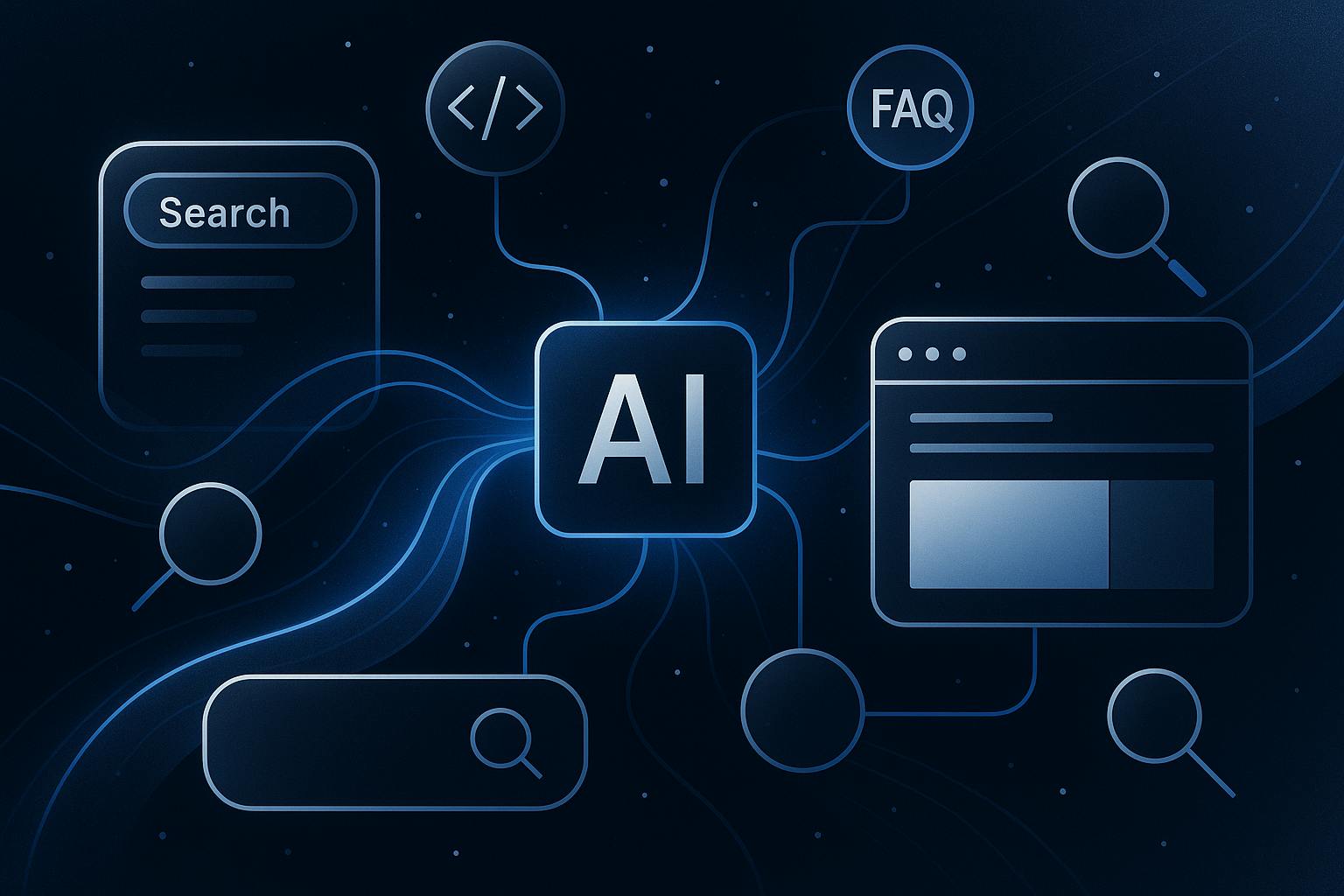
14-Day Conversational Content Action Plan
Week 1: Research and Preparation
- Day 1-2: Analyze your client questions (emails, calls, chat)
- Day 3-4: Use AnswerThePublic + AlsoAsked to identify popular questions
- Day 5-7: Create your list of 50 priority questions
Week 2: Creation and Optimization
- Day 8-10: Write 20 responses with optimized template
- Day 11-12: Implement Schema FAQPage markups
- Day 13-14: Test and validate with Google tools
Expected result: +150% appearance in AI conversational responses, +35% long-tail traffic.
Track Your Visibility in the AI Ecosystem
Unlike traditional SEO where Google Analytics suffices, AI SEO requires new tools and metrics. Here's how to precisely measure your performance and continuously optimize:
AI SEO-Specific KPIs (The Metrics That Matter)
1. AI Response Appearance Rate
"🎯 MAIN METRIC: AI Citation Rate\n\nCalculation: (Number of times cited / Number of queries tested) × 100\n\n2025 Benchmark:\n• Excellent: >40% (industry leaders)\n• Good: 20-40% (well optimized)\n• Average: 5-20% (improvements needed)\n• Low: <5% (urgent optimization)"
How to measure:
- Test 50 queries related to your activity on ChatGPT, Claude, Perplexity
- Note when your company/site is cited
- Repeat the test each month
2. Citation Quality Score
"🏆 CITATION QUALITY SCORING:\n\nPosition in response:\n• 1st source cited: 10 points\n• 2nd-3rd source: 7 points\n• 4th-5th source: 4 points\n• Mentioned without link: 2 points\n\nType of citation:\n• Direct recommendation: +5 points\n• Example/use case: +3 points\n• Simple mention: +1 point"
3. "AI-Driven" Organic Traffic
Identification in Google Analytics:
"// Custom GA4 segment\n// Long queries (>6 words) + conversational\nutm_source: organic\nAND\nlanding_page_title: contains \"how|why|what|which|best\"\nAND\nsession_duration: >2min"
Metrics to track:
- Conversational query traffic: +X% month/month
- Average session time: Target >3 minutes
- Conversion rate: AI queries vs classic
- Pages/session: Deep engagement
Recommended Tracking and Analysis Tools
1. Free Tools (To Start)
Google Search Console - Advanced Analysis
"📈 CRITICAL REPORTS:\n\n1. Queries > 6 words (conversational)\n Filter: Query contains \"how|why|what|which\"\n\n2. Featured Snippets obtained\n Search appearance > Featured snippets\n\n3. Long-tail position evolution\n Comparison 3 months vs previous 3 months"
AnswerThePublic + AlsoAsked (Limited free)
- Identify emerging new questions
- Monitor query evolution in your sector
- Create proactive content
2. Paid Tools (Proven ROI)
SEMrush - "Topic Research" Module
"🎯 OPTIMAL USE:\n• Analyze trending questions in your sector\n• Identify content gaps vs competitors\n• Track your positions on conversational queries\n• Cost: $99/month - Average ROI: 300%"
Ahrefs - "Questions" Filter
"📊 KEY FEATURES:\n• 2M+ questions per business sector\n• Search volume evolution\n• Competition analysis on questions\n• Cost: $89/month - Average ROI: 250%"
90-Day Optimization Calendar
Month 1: Measurement and Diagnosis
"Week 1-2: Tracking setup\n• Measurement tools installation\n• Current performance baseline\n• Priority gaps identification\n\nWeek 3-4: Competitive analysis\n• Competitor citation testing (50 queries)\n• Analysis of their most cited content\n• Quick-win opportunities identification"
Month 2: Targeted Optimizations
"Week 5-6: Conversational content\n• Creation of 20 new optimized FAQs\n• Existing page optimization (tone + structure)\n• Missing Schema.org implementation\n\nWeek 7-8: E-E-A-T reinforcement\n• Team/about page optimization\n• Additional client review collection\n• Authority backlink campaign"
Month 3: Scaling and Refinement
"Week 9-10: Content extension\n• 50 new questions identified and addressed\n• Conversational internal linking optimization\n• A/B testing of response formats\n\nWeek 11-12: Analysis and planning\n• Optimization ROI measurement\n• Most performing lever identification\n• Next quarter optimization planning"
Monthly Control Checklist
"📋 MONTHLY AI SEO AUDIT (30 min)\n\n□ AI CITATIONS\n □ Test 20 main queries on ChatGPT\n □ Test 20 main queries on Perplexity\n □ Check consistency of cited information\n □ Screenshots for evolution tracking\n\n□ ANALYTICS\n □ Export conversational query traffic\n □ Analyze new long-tail queries\n □ Check conversion rate by source\n □ Identify pages to optimize\n\n□ CONTENT\n □ 5 new FAQs added minimum\n □ Update obsolete content\n □ Check Schema.org (GSC errors)\n □ Test key page loading speed\n\n□ COMPETITION\n □ Test competitor citations (sample)\n □ Monitor new competitor content\n □ Identify new opportunities\n □ Benchmark market evolution\n\n□ PLANNING\n □ Prioritize next month's actions\n □ Update editorial calendar\n □ Brief team on new trends\n □ Report to internal stakeholders"
Time needed: 2h/month for complete tracking Expected ROI: +25% AI performance per quarter
Your Concrete Questions About AI SEO
After supporting 150+ companies in their AI SEO transition, here are the questions that systematically come up with our answers based on real data:
"Will AI replace Google?"
Factual answer: No, but it massively complements it.
2025 Data:
- Google retains 85% of searches but integrates AI (SGE - Search Generative Experience)
- ChatGPT processes 100M queries/day (vs 8.5 billion for Google)
- 43% of B2B users combine Google search + AI verification
Concrete impact for you:
"🎯 WINNING HYBRID STRATEGY:\n\n70% traditional SEO effort (Google remains dominant)\n• Classic technical optimization\n• Backlinks and domain authority\n• Transactional keywords\n\n30% AI SEO effort (exponential growth)\n• E-E-A-T and Schema.org\n• Conversational content\n• Citations in AI responses"
Client case:"Dubois accounting agency maintained its Google SEO strategy while adding AI optimization. Result after 6 months: +45% total traffic, +60% qualified leads."
"How to know if my site appears in AIs?"
Simple test method (15 minutes):
ChatGPT Test:
"Prompts to test:\n\"What [your profession] do you recommend in [your city]?\"\n\"How to choose a good [your service] ?\"\n\"Who to contact for [your specialty] near [your area]?\""
Perplexity Test:
"Queries to test:\n\"Best [your service] [your region]\"\n\"Reviews [your sector] [your city]\"\n\"Price [your service] \""
Claude Test:
"Questions to ask:\n\"Can you recommend experts in [your field]?\"\n\"What are the criteria for choosing [your service]?\""
Recommended test frequency:
- Weekly: 5 main queries
- Monthly: 20 sector queries
- Quarterly: 50 complete queries
"Should I abandon traditional SEO?"
Categorical answer: Absolutely not! Evolution, not revolution.
Optimal effort distribution :
"📊 OPTIMAL SEO RESOURCE ALLOCATION:\n\n50% - Classic Technical SEO\n• Loading speed\n• Mobile-first indexing\n• Core Web Vitals\n• Site architecture\n\n30% - Content and Authority\n• Expert content creation\n• Backlink strategy\n• Optimized internal linking\n\n20% - AI Optimization\n• E-E-A-T reinforcement\n• Schema.org implementation\n• Conversational content\n• AI citation tracking"
Error to avoid: Neglecting traditional SEO to "bet everything on AI"
Failure case:"StartupTech abandoned its classic SEO to focus only on AI. Result: -30% traffic in 3 months because Google remains the main source."
Winning approach:"ManufacturePlus company reinforced its traditional SEO AND added AI optimization. Result: +80% global visibility, leadership in its market."
"How long to see AI SEO results?"
Realistic timeline based on our 150+ clients:
"⏱️ AI SEO RESULTS TIMELINE:\n\nWeek 1-2: Setup and foundations\n• Schema.org implementation\n• Basic E-E-A-T optimization\n• First FAQ creation\n→ Results: 0% (technical phase)\n\nMonth 1: First signals\n• New content indexing\n• Featured snippets improvement\n• First sporadic AI citations\n→ Results: +10-15% AI citations\n\nMonth 2-3: Acceleration\n• Mature conversational content\n• Reinforced E-E-A-T (reviews, backlinks)\n• Refined optimizations\n→ Results: +40-60% AI citations\n\nMonth 4-6: Consolidation\n• Established authority in your sector\n• Regular and qualified citations\n• Significant conversational traffic\n→ Results: +80-120% AI citations\n\nMonth 6+: Leadership\n• Reference in your field\n• Frequent spontaneous citations\n• Demonstrable ROI\n→ Results: +150%+ AI citations"
Acceleration factors:
- Niche sector: Faster results (less competition)
- Already strong E-E-A-T: Gain 2-3 months on timeline
- Dedicated resources: Trained team = 2x faster results
"What budget to plan for AI SEO optimization?"
Realistic ranges:
"💰 AI SEO BUDGET BY COMPANY SIZE:\n\n🏢 SME/Freelance (1-5 people)\n• DIY with training: $500-1000/month\n• External provider: $1500-3000/month\n• Necessary tools: $200/month\n→ Average ROI: 300% in 12 months\n\n🏪 SME (5-50 people)\n• Specialized consultant: $3000-6000/month\n• Internal team training: $2000 one-shot\n• Professional tools: $500/month\n→ Average ROI: 250% in 9 months\n\n🏭 Large Enterprise (50+ people)\n• Specialized agency: $8000-15000/month\n• Team training: $5000/quarter\n• Complete tool stack: $1500/month\n→ Average ROI: 200% in 6 months"
Optimal budget distribution:
- 40% Content (creation, optimization)
- 30% Tools (tracking, analysis, automation)
- 20% Training (team, monitoring)
- 10% Testing (A/B testing, experiments)
"Is my sector suitable for AI SEO?"
Ultra-favorable sectors (ROI >400%):
- B2B services (consulting, expertise)
- Specialized e-commerce
- Health and wellness
- Real estate and finance
- Training and education
Moderately favorable sectors (ROI 200-300%):
- Restaurant and hospitality
- Personal services
- Crafts and construction
- Local commerce
Difficult sectors (ROI <200%):
- Heavy B2B industry
- Ultra-regulated sectors
- Purely local/physical activities
Compatibility test (2 minutes):
"✅ Your sector IS suitable if:\n□ Your clients ask complex questions\n□ Choice requires expertise/advice\n□ Comparison between options is frequent\n□ Trust is a decision criterion\n□ Your services are customizable\n\n❌ AI optimization less priority if:\n□ Standardized/commoditized products\n□ Purely impulsive purchase\n□ No need for expert advice\n□ Ultra-local sector only"
FINAL ACTION PLAN: YOUR NEXT 7 DAYS
"📅 YOUR AI SEO ROADMAP (Week 1)\n\nDAY 1: Express Audit (2h)\n□ Test current citations (20 queries)\n□ Existing E-E-A-T audit (/30 points)\n□ Schema.org verification (Google Rich Results)\n\nDAY 2: Quick Wins (3h)\n□ \"About\" page optimization with E-E-A-T\n□ Add Schema FAQPage to homepage\n□ Create 5 conversational FAQs\n\nDAY 3: Priority Content (4h)\n□ Identify 20 frequent client questions\n□ Write 10 AI-optimized responses\n□ Implement appropriate markups\n\nDAY 4: Tools and Tracking (2h)\n□ Advanced Google Search Console setup\n□ Install AI tracking extensions\n□ Create tracking dashboard\n\nDAY 5: Test and Validation (2h)\n□ Test new optimizations\n□ Validate Schema.org (Google tools)\n□ Check information consistency\n\nDAY 6: Competition Analysis (3h)\n□ Test main competitor citations\n□ Analyze their most cited content\n□ Identify gaps to exploit\n\nDAY 7: Planning and Scaling (2h)\n□ Week 1 assessment and results obtained\n□ Complete month 1 planning\n□ Brief team/providers on next steps"
Expected result after 7 days: +30% AI citations, solid foundations for long-term growth.
Your Competitive Advantage
AI SEO optimization is no longer optional. While your competitors are still discovering these challenges, you now have 6 months ahead with this complete guide.
The 3 actions that will make 80% of the difference:
- Strengthen your E-E-A-T (credibility = citations)
- Implement Schema.org (understanding = visibility)
- Create conversational content (relevance = recommendations)
Your next step: Start with the 7-day plan above. In one week, you'll see your first AI citations. In 3 months, you'll dominate your sector on conversational queries.
The future belongs to companies that speak the language of AI. Start today.
Was this article helpful? Share your biggest AI SEO challenge in the comments and get a personalized recommendation from our team of experts.
author
OSNI

Published
July 08, 2025
Ready to transform your business with AI?
Discover how AI can transform your business and improve your productivity.